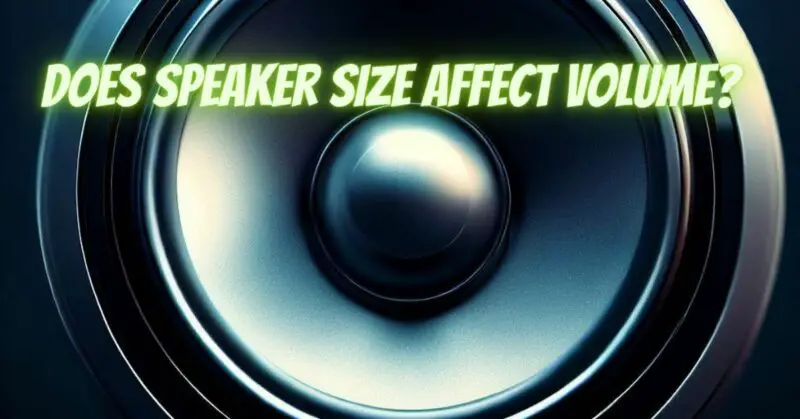When it comes to audio systems, the size of the speakers is a factor that often raises questions among enthusiasts and consumers. Many wonder whether speaker size has a direct impact on volume levels. In this article, we’ll explore the relationship between speaker size and volume and shed light on the various factors that influence the perceived loudness of a speaker system.
The Basics of Speaker Size
Speaker size refers to the diameter of the speaker’s diaphragm or cone, commonly measured in inches. Common speaker sizes include 6.5 inches, 8 inches, 10 inches, 12 inches, and larger. The size of the speaker can influence several aspects of its performance, including its ability to produce sound at different volume levels.
Speaker Size and Volume: The Relationship
While it’s a common belief that larger speakers are inherently louder, the truth is more nuanced. Speaker size does play a role in determining a speaker’s volume potential, but it is just one of several factors that contribute to how loud a speaker can get. Here’s how speaker size interacts with other factors:
- Cone Area: Larger speakers typically have a greater surface area on their cones. This increased cone area allows them to move more air when driven by an amplifier, which can result in higher sound pressure levels (SPL) and, in turn, greater perceived volume.
- Efficiency and Sensitivity: The efficiency and sensitivity of a speaker have a substantial impact on its volume. Some smaller speakers with high sensitivity ratings can produce impressive volume levels. Conversely, larger speakers with lower sensitivity may not reach the same loudness.
- Amplification: The power of the amplifier driving the speaker is a critical factor. A high-powered amplifier can make even small speakers produce high volumes, while a low-powered amplifier may limit the loudness of large speakers.
- Enclosure Design: The design of the speaker enclosure also influences volume. A well-designed enclosure can enhance a speaker’s efficiency and low-frequency response, potentially increasing its perceived volume.
Considerations When Choosing Speaker Size
When selecting speakers for your audio system, it’s essential to consider the following:
- Application: Think about the intended use of the speakers. For home audio or studio monitoring, smaller speakers may suffice. For live performances or large venues, larger speakers or a combination of sizes might be necessary.
- Sensitivity: Check the sensitivity rating of the speakers. Higher sensitivity speakers are more efficient and require less power to produce high volumes.
- Amplifier Matching: Ensure that the speakers are compatible with the amplifier’s power output. Mismatched components can result in suboptimal performance.
- Room Size: Consider the size of the room where the speakers will be used. Smaller rooms may not require as much volume as larger ones.
Speaker size does have an impact on a speaker’s volume potential, but it is only one piece of the puzzle. Other factors, including sensitivity, amplifier power, and enclosure design, play significant roles in determining how loud a speaker can get. When choosing speakers, it’s crucial to consider your specific needs and the context in which they will be used to ensure that you achieve the desired volume levels and overall audio performance.


